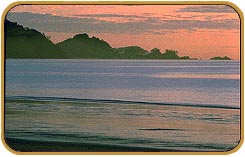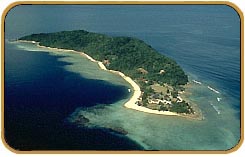 It would be an impossible task to
describe every one of Malaysia's thousands of beautiful
beaches. Ranging from the powdery stretches of sand that
characterize the eastern coastline of Peninsular Malaysia
to the black sand beach of Pantai Pasir Hitam and the
smooth pebble beach of Pantai Batu Kerikil, Malaysia's
shores offer more idyllic locales than one could explore
in many lifetimes. In addition to the plenitude of
beaches along the the peninsula and the coast of Eastern
Malaysia, the country also possesses over a hundred
tropical islands. Many of these are so beautiful as to
have entered into legend centuries ago, like the islands
of Langkawi remain desert
isles, marked , or Pulau Tioman.
Others only by the imprint of the South China Sea on
their sands.
It would be an impossible task to
describe every one of Malaysia's thousands of beautiful
beaches. Ranging from the powdery stretches of sand that
characterize the eastern coastline of Peninsular Malaysia
to the black sand beach of Pantai Pasir Hitam and the
smooth pebble beach of Pantai Batu Kerikil, Malaysia's
shores offer more idyllic locales than one could explore
in many lifetimes. In addition to the plenitude of
beaches along the the peninsula and the coast of Eastern
Malaysia, the country also possesses over a hundred
tropical islands. Many of these are so beautiful as to
have entered into legend centuries ago, like the islands
of Langkawi remain desert
isles, marked , or Pulau Tioman.
Others only by the imprint of the South China Sea on
their sands.
 Despite
such abundance and variety, Malaysia's beaches are
noticeably different from those in other parts of the
world. They are often less differentiated from the
shoreline than those of the Caribbean, for example,
tending instead to be almost nestled up against the lush
forests that this nation is famous for. The color palette
is different as well--golden sands and emerald waters
imbue Malaysian beaches with an air of succulent
sweetness that isn't found in the cool whites and blues
of many western strands. The result is that these beaches
impart a very different sensation, a sense of languid
peace and a distinct feeling that the division between
land and sea is less a sharp line than a smooth
continuum.
Despite
such abundance and variety, Malaysia's beaches are
noticeably different from those in other parts of the
world. They are often less differentiated from the
shoreline than those of the Caribbean, for example,
tending instead to be almost nestled up against the lush
forests that this nation is famous for. The color palette
is different as well--golden sands and emerald waters
imbue Malaysian beaches with an air of succulent
sweetness that isn't found in the cool whites and blues
of many western strands. The result is that these beaches
impart a very different sensation, a sense of languid
peace and a distinct feeling that the division between
land and sea is less a sharp line than a smooth
continuum.
This continuity is noticeable in Malay culture as
well. Kelongs, the traditional villages of coastal
Malaysia, are built out over the water on stilts,
reversing the usual notion of a beach view. Exploring the
waters of Malaysia can produce a similar sense that the
sea rather than the land is dominant here--cruising among
the islands of Langkawi or those off Johor, for example,
or scuba diving and snorkeling among the country's many
world-class reefs.